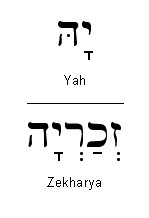The mappiq (מַפִּיק mapík; also mapiq, mapik, mappik, lit. "causing to go out") is a diacritic used in the Hebrew alphabet. It is part of the Masoretes'...
5 KB (448 words) - 14:46, 12 August 2024
consonant is rarely indicated by a special marking, hamza in Arabic and mappiq in Tiberian Hebrew. In later Semitic languages, aleph could sometimes function...
25 KB (2,494 words) - 16:46, 31 October 2024
(sometimes) that a consonant is single and not double; or, as the opposite to a mappiq, to show that the letters ה or א are silent (mater lectionis). The rafe...
10 KB (544 words) - 01:40, 25 October 2024
functions, the mappiq and the shuruk, are visually identical to the dagesh but are only used with vowel letters. The dagesh and mappiq symbols are often...
28 KB (1,633 words) - 18:13, 29 October 2024
sin-dot and shin-dot, the letter "ש" (sin/shin) is used. 3 The dagesh, mappiq, and shuruk have different uses, but the same graphical representation,...
37 KB (1,372 words) - 16:05, 25 October 2024
dot is a shuruk and otherwise it is a vav with a dagesh or a mappiq. Furthermore, the mappiq only appears at the end of the word and only in the letter...
23 KB (2,162 words) - 00:02, 23 October 2024
pronunciation and not consistent in the spoken language. Note 3: The dagesh, mappiq, and shuruk have different functions, even though they look the same. Note...
122 KB (5,338 words) - 13:06, 25 October 2024
is geminate or unspirantized, and a raphe indicates spirantization. The mappiq indicates that ה is consonantal, not silent, in syllable-coda position...
8 KB (705 words) - 16:26, 25 October 2024
used, meaning "her" (see Mappiq). The final H sound is hardly ever pronounced in Modern Hebrew. However, the final H with Mappiq still retains the guttural...
30 KB (2,836 words) - 15:25, 18 October 2024
used since it can only be represented by that letter. Note 3: The dagesh, mappiq, and shuruk are different, however, they look the same and are inputted...
20 KB (995 words) - 10:46, 25 October 2024




